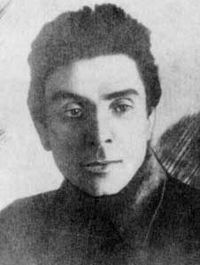- Mykola Khvylovy
-
Mykola Khvylovy 
Mykola FitilovBorn December 1, 1893
Trostyanets, Russian EmpireDied May 13, 1933 (age 39)
Kharkiv, Soviet UnionPen name Khvylovy Occupation writer, poet, security officer Nationality Ukrainian Period 1921-1933 Genres novel Literary movement impressionism, socialist realism Mykola Khvylovy (Ukrainian: Микола Хвильовий, Khvyl’ovyy) (December 13 [O.S. December 1] 1893 – May 13, 1933) was a Ukrainian writer and poet of the early Communist era Ukrainian Renaissance (1920–1930).
Born as Mykola Fitilyov in Trostyanets, Kharkov Governorate to a Russian laborer father and Ukrainian schoolteacher mother, Khvylovy joined the Communist Party in 1919. In the same year he became the chief of local Cheka in Bohodukhiv povit. He moved to Kharkiv in 1921 and involved himself with writers connected to Vasyl Blakytny and the paper Visti VUTsVK (news from All-Ukrainian Central Executive Committee). In 1921, he also published his first poetry collection.
In 1922, he began to focus more on prose writing. His initial collections Syni etiudy (Blue Etudes, 1923) and Osin’ (Autumn, 1924) generated approval from critics like Serhiy Yefremov, Oleksander Biletsky, Volodymyr Koriak, Yevhen Malaniuk and Dmytro Dontsov. His impressions of the work as a CheKa officer are reflected in his 1924 novel "I (Romance)", the hero of which - the head of the local Cheka - sentenced his mother to death in the name of the ideals of the revolution.
A brief member of the literary organization Hart, Khvylovy later became critical of it and the organization Pluh and became a key leader of the VAPLITE organization of Ukrainian "proleteriat" writers. Because of Stalin's repressions against his friends in the pro-Ukrainian Communist movement, Khvylovy committed suicide on 13 May 1933 in front of his friends in his apartment in Kharkiv. His suicide note said: "Arrest of Yalovy - this is the murder of an entire generation ... For what? Because we were the most sincere Communists? I don't understand. The responsibility for the actions of Yalovy's generation lies with me, Khvylovy. Today is a beautiful sunny day. I love life - you can't even imagine how much. Today is the 13th. Remember I was in love with this number? Terribly painful. Long live communism. Long live the socialist construction. Long live the Communist Party."[1]
After his death, his works were banned in the Soviet Union and because of his symbolic potency were mostly not permitted until near the end or after the collapse of the Soviet Union.
Works
Khvylovy wrote both poetry and short stories. His short stories are best known for their difficult narrative forms and complicated imagery.
A novel, titled Valdshnepy (The Woodsnipes), remained unfinished and unpublished when he died. Its second part — the first published in Vaplite in 1927 — had been confiscated.
He wrote a number of pamphlets presenting his views of the connection between politics and art. He advocated an orientation toward cultural trends in Western Europe in order in loosen Ukraine's dependence on Russian forms and inspiration. His pamphlets created a major controversy and divided representatives of the budding Ukrainian literary scene and created tensions with the authorities.
External links
Preceded by
Mykhailo YalovyDirector of Chervony Shliach
1927Succeeded by
Volodymyr ZatonskyCategories:- Ukrainian writers
- 1893 births
- 1933 deaths
- Cheka
- Communist Party of the Soviet Union members
- Ukrainian people stubs
Wikimedia Foundation. 2010.
